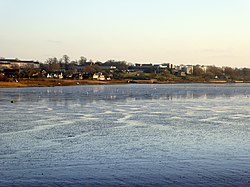Commando Training Centre Royal Marines (CTCRM) is the principal military training centre for the Royal Marines. It is situated near the villages of Lympstone and Exton, between the city of Exeter, and the town of Exmouth in Devon, England.
| Commando Training Centre Royal Marines | |
|---|---|
| Lympstone, Devon, England | |
 Commando Training Centre Royal Marines, from across the River Exe | |
| Coordinates | 50°39′50″N 3°26′17″W / 50.663971°N 3.438024°W |
| Type | Royal Marines Base |
| Site information | |
| Owner | Ministry of Defence |
| Operator | |
| Controlled by | |
| Website | CTCRM Lympstone - Royal Navy |
| Site history | |
| Built | 1940 |
| Built for | Admiralty |
| In use | 1940–present |
| Garrison information | |
| Garrison | Commando Training Centre |
| Occupants | Commando Wing Commando Training Wing Specialist Wing |
History
editThe site was established in 1940 as the "Royal Marines Depot Exton" and was renamed the "Royal Marines Depot Lympstone" later in the Second World War.[1] In February 1960, the Commando School Royal Marines, which had been based at Bickleigh Barracks, moved to the site.[2][3] The site was renamed the "Commando Training Centre Royal Marines" in 1972.[1]
Organisation
editCTCRM is under the full command of Fleet Commander and responsible for providing commando trained officers and other ranks for the front line. CTCRM is overseen by the Commandant CTCRM, a colonel, Royal Marines.[4] CTCRM is structured with three training wings (Command Wing, Commando Training Wing and Specialist Wing) each with its own commanding officer.[4]
Courses
editCandidates who wish to become Other Ranks are required to pass Recruit Orientation Phase (ROP) of four weeks before beginning the mainstream 32 weeks training. Before they start ROP they undergo academic, medical and interview assessments.[5] New entry training for Royal Marines other ranks (culminating in a month long "commando course") is undertaken at CTCRM, at Dartmoor, and at Woodbury Common, Devon, and is conducted over thirty-two weeks.[4] Candidates who pass the commando course receive the award of the green beret, the distinguishing mark of a commando.[4]
Those who wish to become Royal Marine Officers must pass the Potential Officers Course (POC).[6] This is a four-day course that assesses physical and academic ability. Those who pass this and then perform well at the Admiralty Interview Board (AIB) will be offered a place on the Young Officer Training course. This course lasts 15 months, of which 34 weeks are spent at CTCRM[7] and the remainder at Britannia Royal Naval College and on the West Coast of Scotland.[7] CTCRM delivers new entry training to an average of 800 recruits a year. Specialist Wing trains Royal Marines and non-commissioned officers in a wide variety of specialisations e.g.: platoon weapons instructors, mountain leaders, communications and information technology specialists.[4]
Lympstone Commando
editCTCRM is served by Lympstone Commando railway station on the "Avocet Line".[8]
Cadets
editCTCRM is the home of Lympstone Division Royal Marines Volunteer Cadet Corps,[9] which is open to boys and girls aged 9 to 16 (who can serve until aged 18) from the local south east Devon area.[9]
References
edit- ^ a b "75 years of Commando Training at Lympstone". Royal Navy. 23 February 2015. Archived from the original on 25 January 2020. Retrieved 13 May 2016.
- ^ "Royal Marines History" (PDF). Marine Society and Sea Cadet Marine Cadet Section. Archived from the original (PDF) on 5 July 2016. Retrieved 19 November 2016.
- ^ "RMITC / CTCRM - Lympstone". Exeter Flotilla. Archived from the original on 14 May 2017. Retrieved 20 November 2016.
- ^ a b c d e "Commando Training Centre". Royal Navy. Archived from the original on 24 February 2016. Retrieved 13 May 2016.
- ^ "Getting Ready to be a Royal Marines Commando". Retrieved 13 May 2016.
- ^ "Royal Marine Commando Officer | Guide to the Joining Process". royalnavy.mod.uk. Retrieved 29 November 2018.
- ^ a b "Royal Marines Commando | Officer Training | What to Expect". royalnavy.mod.uk. Retrieved 29 November 2018.
- ^ FOI request sent through Whatdotheyknow
- ^ a b "Lympstone". Volunteer Cadet Corps. Retrieved 27 January 2021.


